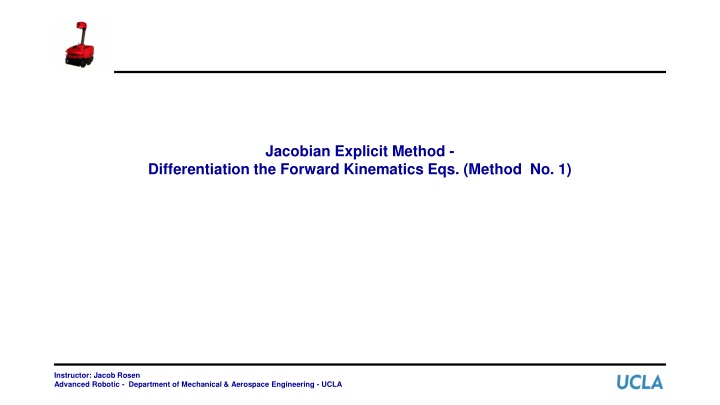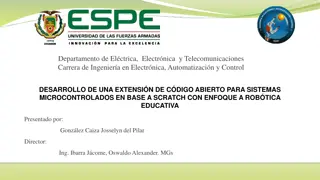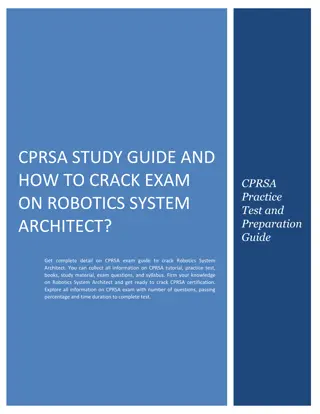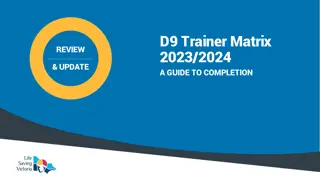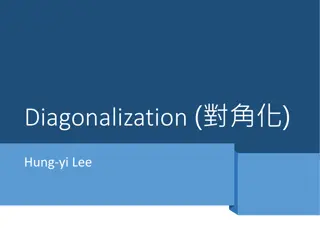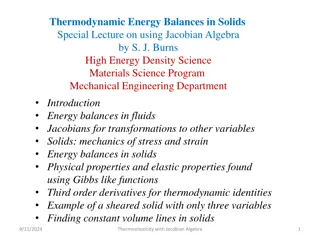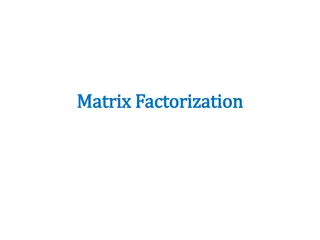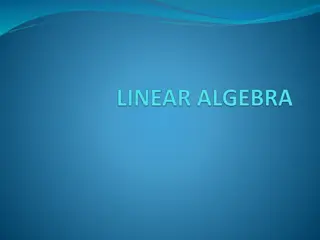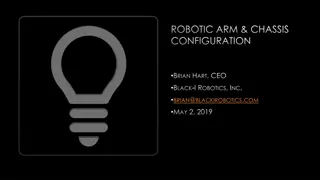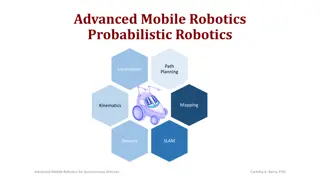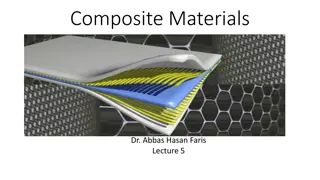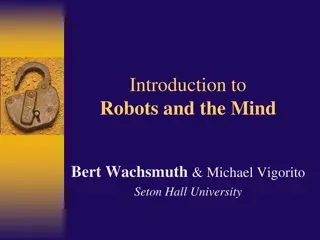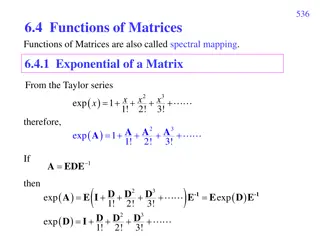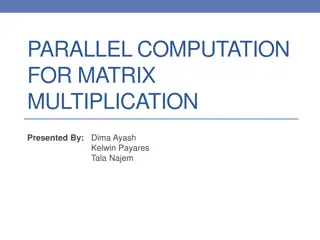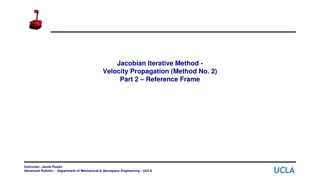Jacobian Matrix in Robotics
Jacobian matrix in robotics is crucial for differentiating the forward kinematics equations. It involves methods such as explicit derivation, iterative techniques, and recursive equations. The matrix columns map angular velocity contributions to linear and angular velocities of the end effector along various axes. Jacob Rosen, an instructor at UCLA, provides detailed explanations and insights into this essential concept.
Download Presentation

Please find below an Image/Link to download the presentation.
The content on the website is provided AS IS for your information and personal use only. It may not be sold, licensed, or shared on other websites without obtaining consent from the author.If you encounter any issues during the download, it is possible that the publisher has removed the file from their server.
You are allowed to download the files provided on this website for personal or commercial use, subject to the condition that they are used lawfully. All files are the property of their respective owners.
The content on the website is provided AS IS for your information and personal use only. It may not be sold, licensed, or shared on other websites without obtaining consent from the author.
E N D
Presentation Transcript
Jacobian Explicit Method - Differentiation the Forward Kinematics Eqs. (Method No. 1) Instructor: Jacob Rosen Advanced Robotic - Department of Mechanical & Aerospace Engineering - UCLA
Jacobian Matrix - Derivation Methods Explicit Method Iterative Methods Recursive Equations Velocity Propagation Base to EE (Method 2) Force/Torque Propagation EE to Base (Method 3) Differentiation the Forward Kinematics Eqs. (Method 1) Jacobian Matrix Instructor: Jacob Rosen Advanced Robotic - Department of Mechanical & Aerospace Engineering - UCLA
Jacobian Explicit Form Overview 0 v ( ) = = 0 X J 0 0 v 1 x ( ) / 0 J v 2 y d 0 v = 3 3 z 0 x ( ) 0 J y 0 z N Instructor: Jacob Rosen Advanced Robotic - Department of Mechanical & Aerospace Engineering - UCLA
Jacobian Matrix The meaning of each column (e.g. the first column) of the Jacobian matrix: J x 11 1 ( ) J J y 21 2 J z 31 = J 41 x ( ) J J 51 y J 61 z N The first column maps the contribution of the angular velocity of the first joint to the linear and angular velocities of the end effector along all the axis (x,y,z) Instructor: Jacob Rosen Advanced Robotic - Department of Mechanical & Aerospace Engineering - UCLA
Jacobian Explicit Method Technique Instructor: Jacob Rosen Advanced Robotic - Department of Mechanical & Aerospace Engineering - UCLA
Jacobian Explicit Form i Revolute Joint Prismatic Joint ( ) J 0 P 0 P 0 i 0 * * Z P 6 6 x ix OR id 0 i 0 * * Z P i = 0 y ix T OR i 0 i 0 * * Z P z ix 0 i 0 0 ( ) Z P P 0 0 0 1 0 Z 6 i i 0 * * * P ( ) 6 x J 0 * * * P = 0 6 6 y T 0 = * * * P 0 0 = Z 1 6 z i 0 0 0 1 Instructor: Jacob Rosen Advanced Robotic - Department of Mechanical & Aerospace Engineering - UCLA
Jacobian Explicit Method Rational Intuitive Explanation Instructor: Jacob Rosen Advanced Robotic - Department of Mechanical & Aerospace Engineering - UCLA
Jacobian Matrix The meaning of each column of the Jacobian matrix: ( ) J J x 1 i 1 J y 2 i 2 J z 3 i = ( ) J J 4 i x J 5 i y J 6 i z N The i th column maps the contribution of the angular velocity of the i th joint to the linear and angular velocities of the end effector along all the axis (x,y,z) Instructor: Jacob Rosen Advanced Robotic - Department of Mechanical & Aerospace Engineering - UCLA
Jacobian Explicit Form i Revolute Joint Prismatic Joint ( ) J 0 P 0 P 0 i 0 * * Z P 6 6 x ix OR id 0 i 0 * * Z P i = 0 y ix T OR i 0 i 0 * * Z P z ix 0 i 0 0 ( ) Z P P 0 0 0 1 0 Z 6 i i 0 * * * P ( ) 6 x J 0 * * * P = 0 6 6 y T 0 = * * * P 0 0 = Z 1 6 z i 0 0 0 1 Instructor: Jacob Rosen Advanced Robotic - Department of Mechanical & Aerospace Engineering - UCLA
Jacobian Explicit Form Linear Velocity Two Cases J The i th column of the Jacobian can be generated by holding all the joints fixed but the i th and actuating the i th at a unite velocity Instructor: Jacob Rosen Advanced Robotic - Department of Mechanical & Aerospace Engineering - UCLA
Jacobian Explicit Form i Revolute Joint Prismatic Joint ( ) J 0 P 0 P 0 i 0 * * Z P 6 6 x ix OR id 0 i 0 * * Z P i = 0 y ix T OR i 0 i 0 * * Z P z ix 0 i 0 0 ( ) Z P P 0 0 0 1 0 Z i k R 6 i i i 0 i 0 * * * P ( ) 6 x J 0 * * * P = 0 6 6 y T 0 = * * * P 0 0 = Z 1 6 z i 0 0 0 1 Instructor: Jacob Rosen Advanced Robotic - Department of Mechanical & Aerospace Engineering - UCLA
J Jacobian Explicit Form Angular Velocity ( ) J ( ) J 0 1 0 1 0 1 0 2 Z Z Z Z 1 n n n n 2 Instructor: Jacob Rosen Advanced Robotic - Department of Mechanical & Aerospace Engineering - UCLA
J Jacobian Explicit Form Angular Velocity Instructor: Jacob Rosen Advanced Robotic - Department of Mechanical & Aerospace Engineering - UCLA
Jacobian Explicit Method Rational Geometrical / Analytical Explanation Based on Velocity Propagation Method Instructor: Jacob Rosen Advanced Robotic - Department of Mechanical & Aerospace Engineering - UCLA
Jacobian Explicit Form i Revolute Joint Prismatic Joint ( ) J 0 P 0 P 0 i 0 * * Z P 6 6 x ix OR id 0 i 0 * * Z P i = 0 y ix T OR i 0 i 0 * * Z P z ix 0 i 0 0 ( ) Z P P 0 0 0 1 0 Z 6 i i 0 * * * P ( ) 6 x J 0 * * * P = 0 6 6 y T 0 = * * * P 0 0 = Z 1 6 z i 0 0 0 1 Instructor: Jacob Rosen Advanced Robotic - Department of Mechanical & Aerospace Engineering - UCLA
J Jacobian Explicit Form Linear Velocity f f f = + + + 1 1 1 y x x x 1 1 2 6 x x x = ( , , , , , ) y f x x x x x x 1 2 6 1 1 1 2 3 4 5 6 f f f = ( , , , , , ) y f x x x x x x = + + + 2 2 2 y x x x 2 2 1 2 3 4 5 6 2 1 2 6 x x x 1 2 6 = ( , , , , , ) y f x x x x x x 6 6 1 2 3 4 5 6 f f f = + + + 6 6 6 y x x x 6 1 2 6 x x x 1 2 6 F Y = (X ) F = Y X X F = = ) ( Y X J X X X Instructor: Jacob Rosen Advanced Robotic - Department of Mechanical & Aerospace Engineering - UCLA
J Jacobian Explicit Form Linear Velocity f f f = + + + 1 1 1 y x x x 1 1 2 6 x x x 1 2 6 f f f 0 P = + + + 2 2 2 y x x x P = i = 0 q 6 q 2 1 2 6 x x x i d 6 i i 1 2 6 i i i f f f = + + + 6 6 6 y x x x 6 1 2 6 x x x 0 P 1 2 6 = 6 J vi i Instructor: Jacob Rosen Advanced Robotic - Department of Mechanical & Aerospace Engineering - UCLA
Jacobian Explicit Form Linear Velocity Derivative J nP 0 The linear velocity of the end effector is . By the chain rule for differentiation 0 n P P = 0 n q n i q i i iq Where is the generalized notation for both the angle (revolute joint) and displacement (prismatic joint) = i d i q i Thus the i th column of which denoted as is given by ( ) J J i 0 P n q i = = 0 1 j q iq This expression is just the linear velocity of the end effector that would result if and all the others Instructor: Jacob Rosen Advanced Robotic - Department of Mechanical & Aerospace Engineering - UCLA
Jacobian Explicit Form i Revolute Joint Prismatic Joint ( ) J 0 P 0 P 0 i 0 * * Z P 6 6 x ix OR id 0 i 0 * * Z P i = 0 y ix T OR i 0 i 0 * * Z P z ix 0 i 0 0 ( ) Z P P 0 0 0 1 0 Z 6 i i 0 * * * P ( ) 6 x J 0 * * * P = 0 6 6 y T 0 = * * * P 0 0 = Z 1 6 z i 0 0 0 1 Instructor: Jacob Rosen Advanced Robotic - Department of Mechanical & Aerospace Engineering - UCLA
Jacobian Matrix The meaning of each column of the Jacobian matrix: ( ) J J x 1 i 1 J y 2 i 2 J z 3 i = ( ) J J 4 i x J 5 i y J 6 i z N The i th column maps the contribution of the angular velocity of the i th joint to the linear and angular velocities of the end effector along all the axis (x,y,z) Instructor: Jacob Rosen Advanced Robotic - Department of Mechanical & Aerospace Engineering - UCLA
Jacobian Explicit Form Linear Velocity Two Cases J The i th column of the Jacobian can be generated by holding all the joints fixed but the i th and actuating the i th at a unite velocity Instructor: Jacob Rosen Advanced Robotic - Department of Mechanical & Aerospace Engineering - UCLA
Jacobian Explicit Form i Revolute Joint Prismatic Joint ( ) J 0 P 0 P 0 i 0 * * Z P 6 6 x ix OR id 0 i 0 * * Z P i = 0 y ix T OR i 0 i 0 * * Z P z ix 0 i 0 0 ( ) Z P P 0 0 0 1 0 Z 6 i i 0 * * * P ( ) 6 x J 0 * * * P = 0 6 6 y T 0 = * * * P 0 0 = Z 1 6 z i 0 0 0 1 Instructor: Jacob Rosen Advanced Robotic - Department of Mechanical & Aerospace Engineering - UCLA
Jacobian Explicit Form Linear Velocity Case 1 Revolute Joint J Freeze all DOF Except the i th DOF (Revolute ) = v r = 0 0 0 ( ) Z P P J 6 i i i vi i 0 * * * P 0 i 0 * * Z P 6 x x ix 0 * * * P 0 i 0 * * Z P = 0 6 6 y T = 0 y ix T 0 i * * * P 0 i 0 * * Z P 6 z z ix 0 0 0 1 0 0 0 1 Instructor: Jacob Rosen Advanced Robotic - Department of Mechanical & Aerospace Engineering - UCLA
Jacobian Explicit Form i Revolute Joint Prismatic Joint ( ) J 0 P 0 P 0 i 0 * * Z P 6 6 x ix OR id 0 i 0 * * Z P i = 0 y ix T OR i 0 i 0 * * Z P z ix 0 i 0 0 ( ) Z P P 0 0 0 1 0 Z 6 i i 0 * * * P ( ) 6 x J 0 * * * P = 0 6 6 y T 0 = * * * P 0 0 = Z 1 6 z i 0 0 0 1 Instructor: Jacob Rosen Advanced Robotic - Department of Mechanical & Aerospace Engineering - UCLA
Jacobian Explicit Form Linear Velocity Case 2- Prismatic Joint J All the joints are fixed except a single prismatic joint. The i th prismatic joint generates pure translation of the end effector The direction of the translation is parallel to the axis i Z 0?? 0?? 0?? 0 0 1 ? 0? 0? 0??= ?? ? = ?? = ?? ? ? ? 0?? 0?? 0?? 0 ? 0? = ? ? 0 0 1 ? Instructor: Jacob Rosen Advanced Robotic - Department of Mechanical & Aerospace Engineering - UCLA
Jacobian Explicit Form i Revolute Joint Prismatic Joint ( ) J 0 P 0 P 0 i 0 * * Z P 6 6 x ix OR id 0 i 0 * * Z P i = 0 y ix T OR i 0 i 0 * * Z P z ix 0 i 0 0 ( ) Z P P 0 0 0 1 0 Z 6 i i 0 * * * P ( ) 6 x J 0 * * * P = 0 6 6 y T 0 = * * * P 0 0 = Z 1 6 z i 0 0 0 1 Instructor: Jacob Rosen Advanced Robotic - Department of Mechanical & Aerospace Engineering - UCLA
J Jacobian Explicit Form Angular Velocity 0 + + = + 1 1 i i i i 0 R + 1 i i + 1 i 0 0 For i=0 = + 1 1 0 0 0 R 1 0 1 1 0 0 0 For i=1 = + = + 2 2 1 1 2 1 0 0 0 R R 2 1 2 1 2 0 2 1 2 0 0 0 0 0 0 = + = + + = + + 3 3 2 2 3 2 2 1 3 1 3 2 0 0 0 0 0 0 0 R R R R R For i=2 3 2 3 1 2 3 1 2 3 3 1 2 3 1 2 3 Instructor: Jacob Rosen Advanced Robotic - Department of Mechanical & Aerospace Engineering - UCLA
J Jacobian Explicit Form Angular Velocity I 0 0 0 0 0 = + = + + + 1 n n 1 n n 1 n 2 n 3 n n 0 0 0 0 0 R R R R R For i=n-1 1 1 2 3 n n n n n 3 1 2 3 n 0 Multiply both side of the equations by R n 0 0 0 0 0 = + = + + + + 0 0 1 0 0 0 0 n n 1 n n 1 n 2 n 3 n n 0 0 0 0 0 R R R R R R R R R R R 1 1 2 3 n n n n n n n n n n n 3 1 2 3 n Instructor: Jacob Rosen Advanced Robotic - Department of Mechanical & Aerospace Engineering - UCLA
J Jacobian Explicit Form Angular Velocity 0 0 0 0 0 = + = + + + + 0 0 1 0 0 0 0 n n 1 n n 1 n 2 n 3 n n 0 0 0 0 0 R R R R R R R R R R R 1 1 2 3 n n n n n n n n n n n 3 1 2 3 n 0 0 0 0 = = + + + + 0 0 1 0 2 0 3 0 0 0 0 0 R R R R 1 2 3 n n n 1 2 3 n 0 n n n = i = i = i k i i = = = 0 0 0 0 0 R R Z n i i i i i i 1 1 1 i Instructor: Jacob Rosen Advanced Robotic - Department of Mechanical & Aerospace Engineering - UCLA
J Jacobian Explicit Form Angular Velocity ( ) J ( ) J 0 1 0 1 0 1 0 2 Z Z Z Z 1 n n n n 2 Instructor: Jacob Rosen Advanced Robotic - Department of Mechanical & Aerospace Engineering - UCLA
J Jacobian Explicit Form Angular Velocity Instructor: Jacob Rosen Advanced Robotic - Department of Mechanical & Aerospace Engineering - UCLA
3R Example Explicit Methods Instructor: Jacob Rosen Advanced Robotic - Department of Mechanical & Aerospace Engineering - UCLA
Angular and Linear Velocities - 3R Robot - Example For the manipulator shown in the figure, compute the angular and linear velocity of the tool frame relative to the base frame expressed in the tool frame (that is, calculate and ). 4 4v 4 4 Instructor: Jacob Rosen Advanced Robotic - Department of Mechanical & Aerospace Engineering - UCLA
Angular and Linear Velocities - 3R Robot - Example Frame attachment Instructor: Jacob Rosen Advanced Robotic - Department of Mechanical & Aerospace Engineering - UCLA
Angular and Linear Velocities - 3R Robot - Example DH Parameters i 1 2 3 4 i 0 90 0 0 i 1 0 id 0 0 0 0 ia 0 L1 L2 L3 1 1 2 3 Instructor: Jacob Rosen Advanced Robotic - Department of Mechanical & Aerospace Engineering - UCLA
Angular and Linear Velocities - 3R Robot - Example From the DH parameter table, we can specify the homogeneous transform matrix for each adjacent link pair: ?1 ?1 0 0 ?2 0 ?2 0 ?3 ?3 0 0 1 0 0 0 ?1 ?1 0 0 ?2 0 ?2 0 ?3 ?3 0 0 0 1 0 0 0 0 1 0 0 0 0 1 ??? ??? ?????? 1 ?????? 1 0 0 ?? 1 0? = ?????? 1 ?????? 1 0 ??? 1 ??? 1 0 ??? 1?? ??? 1? 1 1 ? 1? = ? 0 ?1 0 0 1 1 0 0 0 0 1 0 ?3 0 0 1 1? = 2 ?2 0 0 1 2? = 3 0 0 1 0 3? = 4
Jacobian Explicit Form i Revolute Joint Prismatic Joint ( ) J 0 P 0 P 0 i 0 * * Z P 6 6 x ix OR id 0 i 0 * * Z P i = 0 y ix T OR i 0 i 0 * * Z P z ix 0 i 0 0 ( ) Z P P 0 0 0 1 0 Z 6 i i 0 * * * P ( ) 6 x J 0 * * * P = 0 6 6 y T 0 = * * * P 0 0 = Z 1 6 z i 0 0 0 1 Instructor: Jacob Rosen Advanced Robotic - Department of Mechanical & Aerospace Engineering - UCLA
Angular and Linear Velocities - 3R Robot - Example The homogeneous transform matrix from frame 0 to each one of the joints (1,2,3,4) ?1 ?1 0 0 ?1 ?1 0 0 0 0 1 0 0 0 0 1 0? = 1 ?1 ?1 0 0 ?1 ?1 0 0 0 0 1 0 0 0 0 1 ?2 0 ?2 0 ?2 0 ?2 0 0 ?1 0 0 1 ?1?2 ?1?2 ?2 0 ?1?1 ?1?2 ?2 0 ?1 ?1 0 0 ?1?1 ?1?1 0 1 1 0 0 0? =1 0?2 1? = = 2 ?1?23 ?1?23 ?23 0 ?1?23 ?1?23 ?23 0 ?1 ?1 0 0 ?1(?1 + ?2?2) ?1(?1 + ?2?2) ?2?2 1 ?1 ?1 0 0 ?1 ?1 0 0 0 0 1 0 0 0 0 1 ?2 0 ?2 0 ?2 0 ?2 0 0 ?1 0 0 1 ?3 ?3 0 0 ?3 ?3 0 0 0 0 1 0 ?2 0 0 1 1 0 0 0? =1 0?2 1?3 2? = = 3 ?1?23 ?1?23 ?23 0 ?1?23 ?1?23 ?23 0 ?1 ?1 0 0 ?1(?1 + ?3?23 + ?2?2) ?1(?1 + ?3?23 + ?2?2) ?3?23 + ?2?2 1 ?1 ?1 0 0 ?1 ?1 0 0 0 0 1 0 0 0 0 1 ?2 0 ?2 0 ?2 0 ?2 0 0 ?1 0 0 1 ?3 ?3 0 0 ?3 ?3 0 0 0 0 1 0 ?2 0 0 1 1 0 0 0 0 1 0 0 0 0 1 0 ?3 0 0 1 1 0 0 0? =1 0?2 1?3 2?4 3? = = 4
Angular and Linear Velocities - 3R Robot - Example Expressing the columns of ?? . Since all the joints are revolute joints i.e. ? = 1 and the last frame is frame 4 the generic expression for the columns of ?? is ? ?? 0? ( 0??) for ? = 1,2,3,4 0?4 ??? ? = 1 ? 0 ? 0 ? 1 ?1(?1 + ?3?23 + ?2?2) ?1(?1 + ?3?23 + ?2?2) ?3?23 + ?2?2 ?1(?1 + ?3?23 + ?2?2 ?1(?1 + ?3?23 + ?2?2 0 0 0 0 0 0 1 = 0? 0?4 0?1 = = 1 ?1(?1 + ?3?23 + ?2?2) ?1(?1 + ?3?23 + ?2?2) ?3?23 + ?2?2 ??? ? = 2 ? ? ? 0 ?1(?1 + ?3?23 + ?2?2) ?1(?1 + ?3?23 + ?2?2) ?3?23 + ?2?2 ?1 (?3?23 + ?2?2) ?1(?3?23 + ?2?2) ?3?23 + ?2?2 ?1 ?1 0 ?1?1 ?1?1 0 0? 0?4 0?2 = = ?1 ?1 = 2 ?1(?1 + ?3?23 + ?2?2) ?1(?1 + ?3?23 + ?2?2) ?3?23 + ?2?2 ??? ? = 3 ? ? ? ?1(?1 + ?3?23 + ?2?2) ?1(?1 + ?3?23 + ?2?2) ?3?23 + ?2?2 ?1(?1 + ?2?2) ?1(?1 + ?2?2) ?2?2 ?1 ?1 0 ?3?1?23 ?3?1?23 ?3?23 0? 0?4 0?3 = = ?1(?1 + ?2?2) ?1(?1 + ?3?23 + ?2?2) ?1(?1 + ?2?2) ?1(?1 + ?3?23 + ?2?2) ?2?2 = 3 ?3?23 + ?2?2 ??? ? = 4 ?1(?1 + ?3?23 + ?2?2) ?1(?1 + ?3?23 + ?2?2) ?3?23 + ?2?2 ?1(?1 + ?3?23 + ?2?2) ?1(?1 + ?3?23 + ?2?2) ?3?23 + ?2?2 ?1 ?1 0 ? ? ? 0 0 0 0 0 0? 0?4 0?4 = = = ?1 0 ?1 0 4
Angular and Linear Velocities - 3R Robot - Example ?? Expressing the columns of ?? . Since all the joints are revolute joints i.e. ? = 1 and the last frame is frame 4 the generic expression for the columns of ?? is ? 0? for ? = 1,2,3,4 0 0 1 0? = ??? ? = 1 1 ?1 ?1 0 0? = ??? ? = 2 2 ?1 ?1 0 0? = ??? ? = 3 3 ?1 ?1 0 0? = ??? ? = 4 4
Angular and Linear Velocities - 3R Robot - Example Compiling the results into a single matrix ?1(?1 + ?3?23 + ?2?2 ?1(?1 + ?3?23 + ?2?2 0 0 0 1 ?1 (?3?23 + ?2?2) ?1(?3?23 + ?2?2) ?3?23 + ?2?2 ?1 ?1 0 ?3?1?23 ?3?1?23 ?3?23 ?1 ?1 0 ? =
Angular and Linear Velocities - 3R Robot - Example With the end results mapping the joint space velocities to task space velocities ? ? ? ?? ?? ?? ?1(?1 + ?3?23 + ?2?2 ?1(?1 + ?3?23 + ?2?2 0 0 0 1 ?1 (?3?23 + ?2?2) ?1(?3?23 + ?2?2) ?3?23 + ?2?2 ?1 ?1 0 ?3?1?23 ?3?1?23 ?3?23 ?1 ?1 0 ?1 ?2 ?3 = Note 1- Size The size of the matrix is 6x3. Can we control all six velocities of the end effector with only three DOF (Hint: The dimension of the Jacobian matrix will have to be reduced) Note 2 Frame of Reference The explicit method produce an expression of the Jacobian matrix in frame zero
Jacobian Methods of Derivation & the Corresponding Reference Frame Summary Method Jacobian Matrix Reference Frame Transformation to Base Frame (Frame 0) Explicit (Diff. the Forward Kinematic Eq.) None 0 J N Iterative Velocity Eq. Transform Method 1: = 0 0 N v R v N N N = R 0 0 N N N N NJ Transform Method 2: N 0 0 R 0 ( ) ( ) = 0 N N J J N N 0 R N Iterative Force Eq. Transpose = N N T N T [ ] J J N NJ T N Transform 0 0 R 0 ( ) ( ) = 0 N N J J N N 0 R N Instructor: Jacob Rosen Advanced Robotic - Department of Mechanical & Aerospace Engineering - UCLA
